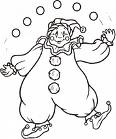Emille

Analista Pedagógico
sexta-feira, 18 de novembro de 2011
quarta-feira, 26 de outubro de 2011
Trava-línguas / Tongue-twisters
Do tongue-twisters twist your tongue?
 | A tongue-twister is a phrase designed to be difficult to articulate properly, correctly and quickly. It consists on attempting to recite a tricky rhyme or phrase as fast as possible without making mistakes on the pronounce challenges and hurdles lurking within these tongue-tying* sentences. An example of a tongue twister is The sixth sick sheikh's sixth sheep's sick, which is supposedly the hardest tongue-twister in the English language according to Guinness World Records. |
By combining the effects of alliteration (repetition of a sound), particularly similar but distinct sounds, with a phrase designed such that it is made very easy to slip accidentally, English tongue-twisters can be guaranteed to provide us with lots of fun and laughter. These sentences and poems may also be used by foreign students of English to improve their accent, actors who need to develop a certain accent, and by speech therapists to help those with speech difficulties.
Another typical tongue-twister is How many slips would a slip ship shift if a slip ship could shift slips? It is a tongue-twister because the letters f and p and the letters s and sh are interchanged in an unfamiliar sequence that is difficult to speak without practice. Try to pronounce the following tongue-twisters. You can also invite you friends to a contest and have bunches of fun!
*tongue-tied = not able to speak because you are shy or nervous.
Peter Piper picked a pack of pickled peppers.

She sells sea shells by the sea shore.

A sailor went to sea to see what he could see.

A noisy noise annoys an oyster.

Give papa a cup of proper coffee in a copper coffee cup.

Shy Shelly says she shall sew sheets.

Five fine fresh fish for you!

The jumbo juggler juggles the jelly in the jug.

If a dog chews shoes, whose shoes does he choose?

The worst word in the world is the word world.

Fat frogs flying past fast.

Six silly sisters selling shiny shoes.

An Ape hates grape cakes.

Six Swiss ships sails swiftly.

How many bagels would a Beagle bake if a Beagle could bake bagels?

Six slippery snails slid slowly seaward.

We surely shall see the sun shine soon.

segunda-feira, 10 de outubro de 2011
Exemplo de Atividade que contempla o descritor 2 - Língua Portuguesa
Leia o texto abaixo e responda às questões
One man in boat
Fishing is my favourite sport. I often fish for hours without catching anything. But this does not worry me. Some fishermen are unlucky. Instead of catching fish, they catch old boots and rubbish. I am even less lucky. I never catch anything – not even old boots. After having spent whole mornings on the river, I always go home with an empty bag “You must give up fishing!” my friends say. “It’s a waste of time”. But they don’t realize one important thing. I’m not really interested in fishing. I am only interested in sitting in a boat and doing nothing at all!
Do livro: PRACTICE AND PROGRESS – An Integrated Course for Pre-Intermediate Students, L. G. Alexander, Longman Group Limited, London.
1. Embora o homem pesque com frequência, ele:
a) Só pega botas velhas e lixo
b) Sempre pega lixo
c) Nunca pega coisa alguma
d) Às vezes pega um peixe
2. Depois de passar manhãs inteiras no rio, ele vai para casa:
a) Com a sacola quase cheia
b) Com as botas velhas que pegou
c) Com o lixo que pegou
d) Com a sacola vazia
3. Os amigos dele costumam dizer que:
a) Um dia ele será um bom pescador
b) Ele deve continuar tentando
c) Ele tem que desistir de pescar
d) Ele precisa se esforçar mais
4. De fato o homem só está interessado em:
a) Fugir do barulho da cidade
b) Passar o dia no barco para ler
c) Poder fumar em paz
d) Passar o dia no barco sem fazer nada
sexta-feira, 30 de setembro de 2011
Atividade com Charge
Hi guys!!! Postando agora uma atividade que estimula a imaginação e consequentemente trabalha a escrita dos nosso alunos, atendendo assim, as capacidades a serem trabalhadas de acordo com o nosso CBC!!!
Observe, read and answer the questions:
My questions:
(a) Who is this couple?
(b) Why was the postal worker surprised?
(c) What is she going to do now?
(b) Why was the postal worker surprised?
(c) What is she going to do now?
quarta-feira, 28 de setembro de 2011
segunda-feira, 26 de setembro de 2011
Songs
Hello everybody!!! Como já sabemos uma das atividades que mais agrada e ensina em sala de aula é a atividade com música, postrarei algumas e espero que comentem e também mostrem o trabalho de vocês aqui!!!
Nessa atividade, a música "Wonderful Tonight" é usada. Essa é uma atividade para turmas de nível básico, a habilidade de compreensão da leitura pode ser desenvolvida. Essa música foi escolhida por apresentar o uso da 3ª pessoa do singular, e por ser uma música desconhecida da maioria dos alunos. Mas essa atividade pode ser adaptada para qualquer outra música em qualquer idioma, desde que nenhum aluno a conheça de cor e seja uma música lenta e fácil de entender.
Em alguns trechos da música, são colocadas em negrito três opções de palavras que poderiam completar determinadas frases. Antes de ouvir a música, os alunos tem que ler a letra e tentar adivinhar “Qual é a palavra”, pelo contexto, que completa aquela frase. Em alguns casos, mais de uma opção faz sentido. Aí, entra a tentativa, que democratiza o jogo: se em todos os casos houver apenas uma palavra correta ou que faz sentido, somente os alunos mais proficientes tem chance de ganhar.
Antes de ouvir a música, os alunos passam a sua folha para um colega, que faz a correção. Quando a música for tocada, os alunos precisam ouvir atentamente o que o cantor diz, pois ninguém ira querer corrigir errado a folha do colega. Contados os acertos de cada um, o ganhador é aquele que tiver adivinhado corretamente o maior número de palavras.
Abaixo, a atividade como foi utilizada em aula:
E coloquei també um dos vídeos como sugestão, logo abaixo dessa postagem.
It's early - late - 8 o'clock in the evening
She's wondering what clothes to wear
She puts on her make up
And brushes her short - curly - long blonde hair
And then she asks me do I look all right
And I say yes, you look wonderful tonight - today - this morning
We go a club - party - game
And everyone turns to see
This pretty - cute - beautiful lady
That's walking around with me
And then she asks me do you feel all right
And I say yes, I feel good - wonderful - great tonight
I feel wonderful
Because I see the love light in your eyes - face - hair
And the wonder of it all
Is that you just don't realize
How many - how much - why I love you
It's time to go home now
And I've got an aching body - head - leg
So I give her the car door - seats - keys
And she helps me to bed - sleep - the bedroom
And then I tell her
As I turn out the TV - stereo - light
I say my darling, you were wonderful tonight
Oh my darling, you were wonderful tonight
Assinar:
Postagens (Atom)
 n
n
